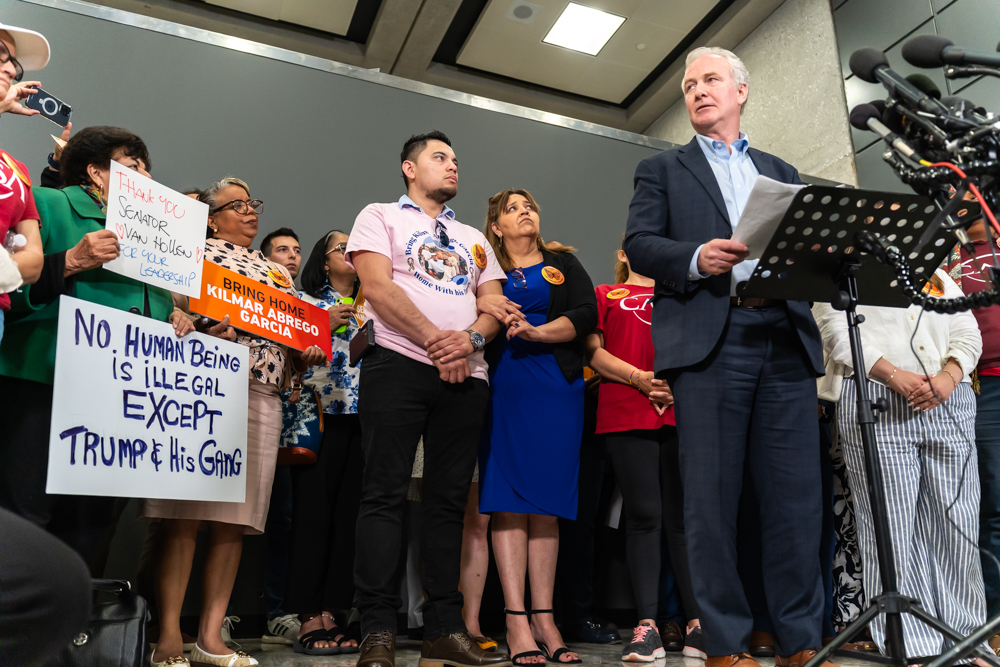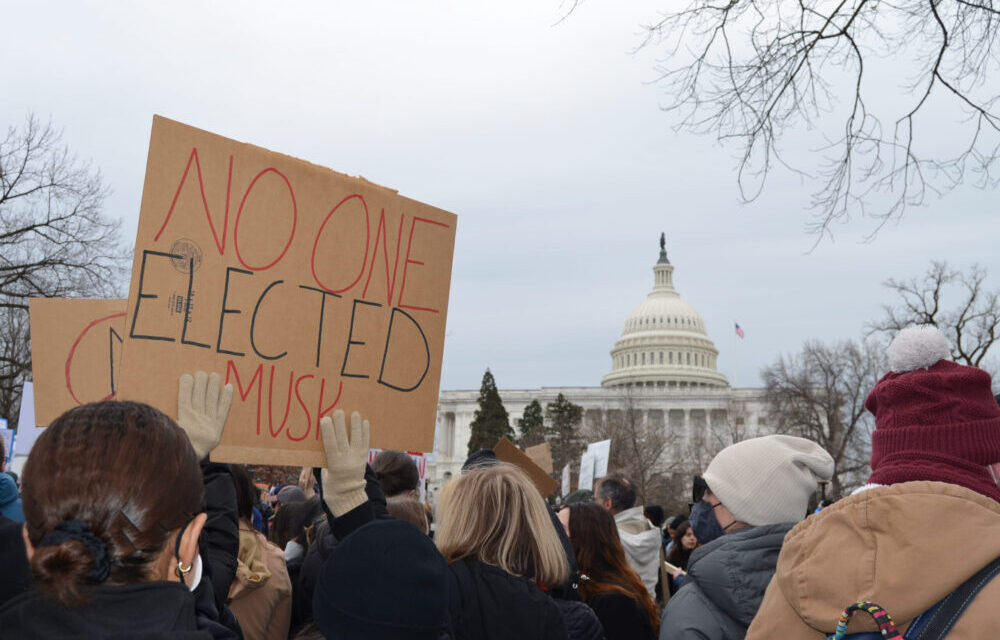By MENNATALLA IBRAHIM and JESS DANINHIRSCH
WASHINGTON — President Donald Trump returned to the White House for his second term with an ambitious agenda that included restructuring the federal government, reinvigorating the economy, redefining U.S. foreign relations and immigration policy, and, of course, “making America great again.”
In his first 100 days, Trump moved quickly to reshape policy and politics, leaning on executive orders, a Republican-controlled Congress and Senate and his newly appointed executive leadership. Capital News Service took a look at key milestones from the 47th president’s early efforts to leave his mark on a turbulent political landscape and a deeply divided nation.

WASHINGTON – A man wears a “Make America Great Again” cap as attendees gather in downtown Washington, D.C., for the inauguration of President Donald Trump on Monday, Jan. 20, 2025. (Giuseppe LoPiccolo/Capital News Service)
JAN. 20 | Day 1
Donald Trump becomes the 47th president of the United States
Hours after taking the oath of office, Trump made history by signing the most first-day executive orders in recent presidential history. He issued 26 orders on Inauguration Day—and 10 more over the following week—targeting a wide range of policy areas. Among them: an attempt to end birthright citizenship, the creation of the Department of Government Efficiency led by billionaire Elon Musk, a freeze on federal hiring, a cut to federal funding and a rollback on diversity, inclusion and equity initiatives.
JAN. 24 | Day 5
Trump fires 17 inspectors general
The president announced the immediate dismissal of 17 inspectors general, the independent watchdogs tasked with uncovering government waste, fraud and abuse, across various federal agencies. This sweeping purge, widely seen as an attempt to eliminate oversight of Trump’s second administration, sparked a lawsuit challenging its legality and fueled ongoing protests outside federal agencies.
JAN. 28 | Day 9
OPM sends federal workers’ ‘Fork in the Road’ email
More than 2 million federal employees received an email from the Office of Personnel Management titled “Fork in the Road,” introducing a new program called deferred resignation. The program allows employees to submit resignations effective Sept. 30 in exchange for full pay, benefits and an exemption from return-to-work mandates until that date. The email hinted that employees who take the buyout might be placed on paid administrative leave or have reduced workloads, although it made no guarantees. The subject line mirrored an email sent to Twitter employees after Musk’s takeover, underscoring DOGE’s growing power in reshaping the federal workforce. The announcement triggered widespread backlash, with federal workers organizing nationwide protests under the banner “Fork Off.”
JAN. 30 | Day 11
Trump links fatal plane collision to DEI initiatives
Without providing any evidence, Trump blamed diversity policies from the Obama and Biden administrations for the fatal Jan. 29 collision between a jetliner and a helicopter near the Ronald Reagan Washington National Airport. He called for a return to merit-based hiring at the Federal Aviation Administration. He was joined at a press conference by Defense Secretary Pete Hegseth, newly appointed Transportation Secretary Sean Duffy, and Vice President J.D. Vance, all of whom echoed Trump’s remarks and praised his leadership.
FEB. 1 | Day 13
Administration proposes tariffs on Mexico, Canada and China
Trump signed an executive order proposing new tariffs on Mexican, Canadian and Chinese imports, triggering swift international and Democratic backlash. Canada and Mexico imposed retaliatory tariffs on U.S. goods, while China warned of unspecified countermeasures. The Trump administration’s 10% tariff on Chinese products took effect Feb. 4 and doubled a month later. Tariffs on Canadian and Mexican goods, initially set at 25%, took effect March 4 but were later reduced to 12% and indefinitely suspended, according to the Tax Foundation.
FEB. 4 | Day 16
Trump suggests U.S. Gaza takeover
The president sparked controversy after suggesting the United States should “take over” and “own” the Gaza Strip during a joint press conference with Israeli Prime Minister Benjamin Netanyahu. The comments drew sharp condemnation from Democrats and unease from some Republicans. In a statement, Maryland Sen. Chris Van Hollen, a Democrat, called the proposal “ethnic cleansing by another name,” accusing Trump of abandoning “decades of bipartisan American support for a two-state solution.”
FEB. 7 | Day 19
DOGE shutters USAID, kicking off series of mass federal terminations
A sweeping mandate ordered all staff at the U.S. Agency for International Development—the world’s largest provider of humanitarian aid—to cease operations and vacate posts worldwide by Feb. 14, under DOGE guidance. This directive triggered widespread federal worker protests and was part of a wave of mass terminations across government agencies in the following days and weeks, including:
- FEB. 17 (Day 29) – Thousands of federal workers on probationary periods, typically the first one or two years of service, were fired from agencies across the government.
- FEB. 27 (Day 39) – Hundreds of workers at the National Oceanic and Atmospheric Administration were abruptly terminated. There has since been a 20% reduction in NOAA’s workforce.
- MARCH 11 (Day 51) – The Department of Education announced that it would be firing more than 1,300 workers. To date, nearly 50% of the department has been dissolved.
- MARCH 27 (Day 67) – The Department of Health and Human Services announced that 10,000 full-time employees would be terminated. Nearly a quarter of HHS has been gutted.
- APRIL 15 (Day 86) – The Internal Revenue Service received about 22,000 resignations after the Trump administration’s buyout offer. The agency is now on track to lose about a third of its staff by the end of the year, experts say.
Feb. 14 | Day 26
Senate confirms RFK Jr. as HHS Secretary
The Senate voted 52-48 to confirm Robert F. Kennedy Jr., a longtime vaccine skeptic, as the health and human services secretary. The department is comprised of key public health agencies, including the Food and Drug Administration, the National Institutes of Health, the Centers for Disease Control and Prevention and the Centers for Medicare and Medicaid Services. Kentucky Sen. Mitch McConnell, a polio survivor, was the only Republican to join all the Democrats in opposition to RFK Jr.
Feb. 28 | Day 40
Trump and Vance publicly criticize the Ukrainian president
The president and vice president berated Ukrainian President Volodymyr Zelenskyy with accusations, false claims and personal insults during a heated Oval Office meeting. Zelenskyy left the White House early, declining to sign a deal that would have granted U.S. support for European peacekeeping forces in Ukraine. The televised exchange drew backlash from Democrats and praise from many Republicans, including some who previously backed Ukraine.
- MARCH 3 (Day 43) – Trump paused all military aid to Ukraine in its war against Russia.
- MARCH 5 (Day 45) – The administration stopped sharing intelligence with Ukraine.
- MARCH 19 (Day 59) – Trump and Zelenskyy had their first conversation since the Oval Office meeting over the phone, which both leaders described as positive and substantive.
MARCH 5 | Day 45
GSA targets hundreds of federal properties for sale
The General Services Administration issued a list of 443 federal office properties that were tagged as “not core to government operations” and subject to sale, but by the next morning, the list had vanished. This move was part of an effort to dramatically reduce the size of the federal government. The administration revised the list before its removal, reducing the number of targeted properties to 320. Among the initial list were 83 locations in Maryland; the revised list had 21 Maryland properties.
MARCH 7 | Day 47
Administration cancels grants to Columbia University
??The Trump administration canceled $400 million in federal grants to Columbia University, citing the school’s alleged failure to protect students from antisemitic harassment. Columbia’s New York campus has been a focal point of ongoing protests against Israel’s military campaign in Gaza and was the first site to host student encampments that later spread to universities nationwide in spring 2024.
- Match 10 (Day 50) – Mahmoud Khalil, a recent Columbia University graduate and lawful U.S. permanent resident who helped lead last year’s campus protests, was detained by ICE agents outside his New York home and transferred to a detention facility in Louisiana. Khalil is one of several demonstration organizers from the university who have been detained in recent weeks, despite holding legal immigration status.
- March 21 (Day 61) – Columbia agreed to a list of the Trump administration’s demands as a condition for restarting negotiations over federal funding. Demands included banning students from wearing masks during protests, hiring new campus security with arrest powers and appointing new leadership to oversee the Department of Middle East, South Asian and African Studies.
MARCH 12 | Day 52
Washington demolishes Black Lives Matter Plaza under pressure from House Republicans
A week after Washington Mayor Muriel Bowser announced the removal of the Black Lives Matter mural, following pressure from the Republican-controlled Congress, construction crews began chipping away at the street painting. The mural was painted in 2020 after the murder of George Floyd and the tear-gassing of protesters. It is set to be replaced by new artwork from local students and artists, but it remains unclear whether the site’s name will change, despite Republican lawmakers pushing to rename it “Liberty Plaza.”

Black Lives Matter Plaza in Washington, D.C. undergoes removal on March 12, 2025. (Jess Daninhirsch/Capital News Service)
MARCH 14 | Day 54
Senate approves spending bill, averting partial government shutdown
The spending bill, drafted by House Republicans, narrowly passed the Senate just hours before the funding deadline despite strong Democratic opposition. The measure, which funds the government until the end of September, cut non-defense spending by roughly $13 billion while increasing defense funding by about $6 billion, including allocations for deportations, veterans’ health care and military operations. A day later, the president signed the legislation into law, averting a partial government shutdown.
MARCH 15 | Day 55
Administration invokes wartime law to carry out mass deportations
A federal judge ordered the Trump administration to stop using the Alien Enemies Act of 1798, an obscure wartime law, to target suspected Venezuelan gang members with little or no due process. In an emergency hearing, U.S. District Judge James Boasberg ruled that any deportation flights already in transit must return to the United States. The administration violated the court order later that day by deporting almost 300 Venezuelans to El Salvador without any due process.
MARCH 24 | Day 64
The Atlantic exposes messages from top administration officials
Jeffrey Goldberg, editor-in-chief of The Atlantic, published a bombshell piece revealing messages between top administration officials about a U.S. bombing campaign in Yemen, after he was mistakenly added to their group chat by Defense Secretary Pete Hegseth. The Signal chat included Vice President J.D. Vance, National Security Advisor Mike Waltz, CIA Director John Ratcliffe and others. Goldberg’s report prompted immediate scrutiny over whether classified information had been improperly disclosed and why officials were using an encrypted messaging platform to discuss sensitive matters. When questioned, Hegseth insisted no classified material had been shared and that the officials had done nothing wrong. National security experts vehemently disagreed.
APRIL 1 | Day 72
Booker breaks Senate record in stand against Trump administration
Sen. Cory Booker, D-New Jersey, delivered the longest recorded solo speech in Senate history, speaking for 25 hours and five minutes to draw attention to what he called a “nation in crisis.” He broke the previous record set in 1957 by then-Sen. Strom Thurmond of South Carolina, at the time a Democrat, who filibustered for 24 hours. In the marathon speech, Booker criticized Trump, the administration and DOGE’s sweeping actions, while sharing more than 200 stories from constituents and Americans across the country.
APRIL 2 | Day 73
Administration announces Trump’s “Liberation Day” tariffs
The administration announced the most sweeping tariff hike since 1930, with the president declaring the day “Liberation Day” and calling the move a “declaration of economic independence.” Trump imposed a baseline 10% tariff on all imported goods beginning April 5, with even higher tariffs on about 60 countries with reciprocal tariffs, including China and the European Union, set to take effect on April 9. The tariffs will not apply to goods already subject to previous tariffs, such as steel, aluminum, cars and imports from Mexico and Canada. The move sent the financial markets tumbling and prompted some manufacturers to announce layoffs, sparking furor among Democrats and U.S. trading partners.
April 5 | Day 76
Biggest day of protest hits Trump’s second term
More than 1,000 “Hands Off” demonstrations swept the country, marking the largest day of protest against Trump’s second administration so far. Organized by more than 150 groups, the protests drew an estimated 500,000 people nationwide. Demonstrators criticized the administration’s federal worker firings, government agency shutdowns, immigrant deportations, cuts to health programs and more.
APRIL 14 | Day 85
Administration freezes Harvard University’s federal funding
The Trump administration announced it was freezing $2 billion in federal funding after Harvard, the nation’s wealthiest university, refused to comply with a list of government demands the school called unlawful. The administration’s demands included limiting student and faculty power in university affairs, reporting foreign students who commit conduct violations to federal authorities and bringing in outside monitors to ensure “viewpoint diversity” across academic departments. Funding also was frozen at several other elite universities, including Princeton, Cornell, Northwestern, Columbia and the University of Pennsylvania.
- APRIL 15 (Day 86) – Under guidance from the administration, the IRS threatened to revoke Harvard’s tax-exempt status.
- APRIL 16 (Day 87) – Administration canceled nearly $3 million in Homeland Security grants to Harvard, declaring the university unfit to be entrusted with taxpayer dollars. In a letter demanding detailed records of foreign student visa holders’ illegal and violent activities by April 30—or risk the termination of such programs — Homeland Security Secretary Kristi Noem accused Harvard of antisemitism and called its leadership “spineless.”
- APRIL 17 (Day 88) – The administration accused Harvard of failing to report large foreign donations to the federal government as required by law.
- APRIL 22 (Day 93) – Harvard sued the Trump administration in federal court, arguing its freeze on research funding is unconstitutional.
APRIL 16 | Day 87
Administration sues Maine after threatening to cut funding over transgender rights
The Trump administration sued the state of Maine, just days after threatening to cut off funding to the state’s public schools and lunch programs, in a standoff over transgender athletes playing in women’s school sports. The administration said that the state ignored Trump’s executive order to ban transgender athletes in sports, claiming that they would “deprive women and girls of fair athletic opportunities.” Maine Gov. Janet Mills said the administration was “acting unlawfully.”
APRIL 17 | Day 88
Van Hollen meets with wrongly deported Maryland man in El Salvador
Maryland Sen. Chris Van Hollen, a Democrat, met with Kilmar Abrego García, a 29-year-old Maryland resident with legal status who was mistakenly deported to El Salvador. Despite a federal judge’s ruling and a Supreme Court order requiring the administration to facilitate Abrego García’s return, Trump has continued to claim that Abrego García is a member of the MS-13 gang. The legal battle over his return is ongoing.
- APRIL 18 (Day 89) – Upon his return from El Salvador, Van Hollen spoke to reporters at Washington Dulles International Airport, confirming that Abrego García is alive and vowing to continue fighting for his return to the United States.

CHANTILLY — Sen. Chris Van Hollen speaks to the press about his recent visit to El Salvador to meet with Kilmar Abrego García at the Dulles International Airport on April 18, 2025. (Jess Daninhirsch/Capital News Service)
APRIL 25 | Day 96
Administration reverses terminations of foreign students’ visa registrations
After cancelling thousands of foreign students’ U.S. visas, the Trump administration has reversed course and restored their visa statuses. The Justice Department announced the reversal after weeks of legal scrutiny and dozens of restraining orders from judges, who ruled the mass termination through a federal database illegal.
APRIL 26 | Day 97
Administration deports three American children without parental consent
Three American-born children were wrongly deported to Honduras alongside their undocumented mothers last week, according to family attorneys and advocacy groups. One mother was removed with two children, including a 4-year-old undergoing cancer treatment, while another case involved a mother and her 2-year-old daughter, whose American father has filed an emergency petition for her return. Advocates and federal judges said these deportations raise alarms about the administration’s immigration crackdown, warning that it violates the Constitution and endangers both migrant children and U.S.-born children of migrants.
APRIL 29 | Day 100
Administration faces more than 200 legal battles
Since returning to the Oval Office, at least 220 lawsuits have been filed against the president and his administration, according to news reports. The suits have challenged nearly every major executive action, from immigration policies and sweeping tariffs to mass federal worker firings.



Recent Comments